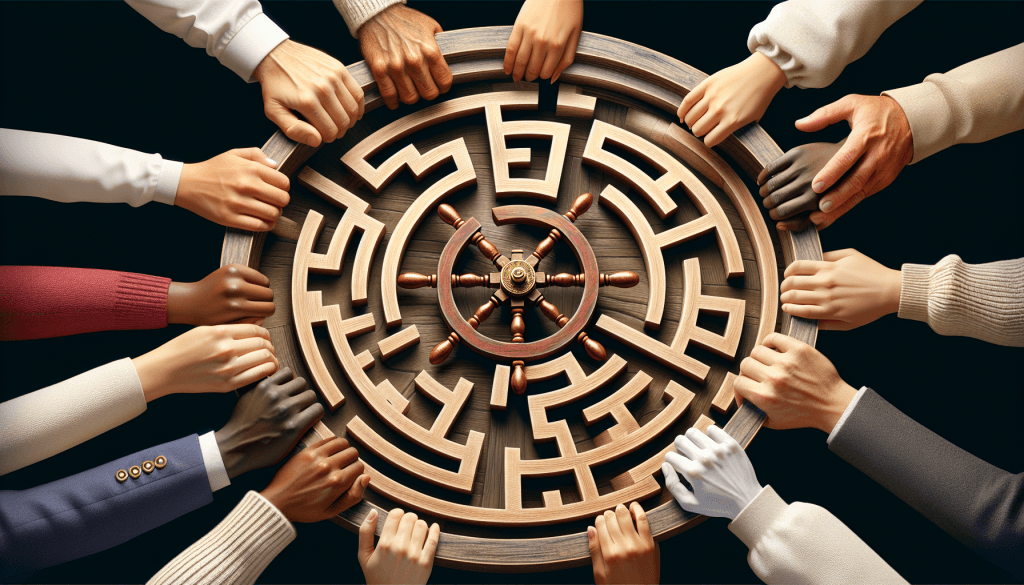How To Navigate Through Changes In Friendships?
Friendships, like seasons, shift and evolve over time. One moment, you’re inseparable, sharing secrets and laughter, and the next, life pulls you in different directions. These changes can feel bittersweet, but they’re a natural part of growing as individuals. Understanding how to handle these transitions can help you maintain meaningful connections or gracefully let go when needed.
If you’ve ever wondered why friendships change or how to handle the emotional rollercoaster that comes with it, keep reading. This guide will walk you through the ups and downs of friendship evolution, offering practical tips and insights to help you navigate these changes with grace and confidence.
Key Takeaways
- Friendships naturally evolve due to life changes, shifting priorities, and personal growth.
- Recognizing when a friendship no longer aligns with your life is essential for emotional well-being.
- Open communication, empathy, and self-reflection are key to managing these transitions.
- Letting go of certain friendships can create space for personal growth and new connections.
Understanding the Nature of Friendship Changes
Why Friendships Evolve Over Time
Friendships aren’t static—they grow and change just like we do. As you move through life, your interests, values, and priorities shift. What bonded you to someone in high school may no longer resonate in adulthood.
Think about it: the carefree days of childhood often give way to the responsibilities of adulthood. Friendships that once thrived on shared hobbies or proximity may struggle to survive when life gets busier. And that’s okay. Change doesn’t mean failure; it’s a sign of growth.
Common Triggers for Changes in Friendships
Life Transitions (e.g., Marriage, Career Changes, Parenthood)
Major life events can shake up your social circle. Getting married, starting a new job, or becoming a parent often leaves less time for friends. These transitions can create distance, both physically and emotionally.
Shifting Priorities and Values
As you grow, your values may change. Maybe you’ve become more focused on personal development, while your friend is still in party mode. These differences can create a natural drift.

Recognizing When Change is Necessary
Signs a Friendship May No Longer Align with Your Life
Feeling Drained or Unsupported
Do you feel exhausted after spending time with a friend? Or do they dismiss your feelings when you need support? These are signs the friendship might not be healthy anymore.
Lack of Mutual Respect or Effort
Friendships should be a two-way street. If you’re always the one reaching out or compromising, it might be time to reassess the relationship.
Differentiating Between Temporary Challenges and Long-Term Incompatibility
Not every rough patch means the end of a friendship. Sometimes, life gets hectic, and people unintentionally drift apart. However, if the issues persist despite efforts to reconnect, it might signal deeper incompatibility.

Navigating Changes in Childhood Friendships as an Adult
Reconnecting with Childhood Friends
Finding Common Ground Despite Different Life Paths
Reconnecting with old friends can feel like stepping into a time machine. But it’s important to acknowledge that you’ve both changed. Focus on shared interests and values to rebuild the bond.
Balancing Nostalgia with Present Realities
While reminiscing about the good old days can be fun, don’t let nostalgia blind you to the present. Acknowledge who your friend is now, not just who they were.
Letting Go of Childhood Friendships That No Longer Serve You
Sometimes, holding onto a friendship out of obligation does more harm than good. Letting go can be tough, but it’s often necessary for personal growth.

Strategies for Managing Evolving Adult Friendships
Communicating Openly About Changes
Expressing Your Feelings and Needs Honestly
Honest conversations can prevent misunderstandings. Share how you’re feeling and what you need from the friendship.
Listening to the Other Person’s Perspective
Communication is a two-way street. Listen to your friend’s feelings and try to understand their perspective.
Setting Boundaries While Maintaining Respect
Boundaries are essential for healthy relationships. They protect your emotional well-being while showing respect for the other person.
Growing Together Through Mutual Understanding
Friendships can thrive when both parties are willing to adapt and grow together. Mutual understanding and effort are key.

Balancing Individual Growth and Group Identity
Tug-of-War Between Self-Identity and Group Dynamics
Staying True to Yourself While Respecting Group Norms
It’s important to honor your individuality while being part of a group. Don’t lose yourself trying to fit in.
Recognizing When Group Identity No Longer Aligns with Personal Growth
If a group’s values clash with your own, it may be time to step back. Growth often requires tough choices.
Broadening Your Networks to Meet New People
Expanding your social circle can introduce you to people who align with your current values and interests.

Rebuilding and Strengthening Friendships
Tips for Reconnecting with Old Friends
Initiating Meaningful Conversations
Start with a simple message or call. Share a memory or ask how they’ve been.
Finding Shared Activities to Rebuild Bonds
Doing something you both enjoy can reignite the connection.
Strengthening Existing Friendships Through Intentional Effort
Small gestures, like checking in regularly or planning quality time, can go a long way in maintaining strong friendships.

Coping with the Emotional Impact of Friendship Changes
Managing Feelings of Loss or Guilt
It’s natural to grieve the loss of a friendship. Allow yourself to feel the emotions, but don’t dwell on guilt.
Practicing Self-Compassion During Transitions
Be kind to yourself. Friendship changes are a normal part of life, not a reflection of your worth.
Seeking Support from Other Relationships or Professionals
Lean on other friends, family, or even a therapist for support. Building a supportive network can help you navigate these changes.
Teaching Children to Navigate Changing Friendships
Helping Children Understand the Natural Evolution of Friendships
Explain to kids that friendships can change as they grow. Use simple examples they can relate to.
Encouraging Empathy and Communication Skills
Teach children to express their feelings and listen to others. These skills will serve them well in all relationships.
Supporting Children in Building New Connections
Encourage kids to join activities or groups where they can meet new friends.

Embracing the Positive Side of Friendship Changes
Opportunities for Personal Growth and Self-Discovery
Every friendship teaches you something about yourself. Embrace the lessons and use them to grow.
Learning to Appreciate the Friendships That Endure
Cherish the friends who stick by you through thick and thin. They’re worth their weight in gold.
Celebrating the Role of Past Friendships in Shaping Who You Are
Even friendships that end leave a lasting impact. Celebrate the memories and lessons they brought into your life.
Practical Tips for Navigating Friendship Changes
Reflecting on Your Own Priorities and Values
Take time to evaluate what you want from your friendships. This clarity will guide your decisions.
Staying Open to New Connections
Don’t be afraid to put yourself out there. New friendships can bring fresh perspectives and joy.
Practicing Gratitude for the Friendships in Your Life
Appreciate the friends who’ve been there for you. A simple “thank you” can mean the world.
For more tips on building healthy relationships, check out our guide.
Friendship changes can feel like navigating uncharted waters, but they’re a natural part of life. By embracing these shifts with an open heart and mind, you’ll not only strengthen your existing relationships but also create space for new, meaningful connections. After all, every ending is just the beginning of something new.
Navigating the Shifts: FAQ on Changes in Friendships
Why do friendships change over time?
Friendships evolve as people grow and their priorities, interests, and circumstances shift. Life events like moving, career changes, or personal growth can naturally alter the dynamics of a friendship, often without any ill intent from either party.
How can I tell if a friendship is worth saving?
Evaluate how the friendship makes you feel. If it brings joy, support, and mutual respect, it’s worth nurturing. However, if it feels one-sided, draining, or toxic, it may be time to reassess its place in your life.
What should I do if I feel left out by a friend?
Open communication is key. Share your feelings with your friend in a non-confrontational way. Sometimes, misunderstandings or unintentional actions can be resolved through honest dialogue.
How can I gracefully let go of a friendship that no longer serves me?
Letting go can be difficult, but it’s important to prioritize your well-being. Be honest but kind, expressing gratitude for the good times while acknowledging that the friendship has run its course. Distance yourself gradually if a direct conversation feels too challenging.
Is it normal to outgrow friendships?
Yes, it’s completely normal. As people grow and change, their needs and connections often shift. Outgrowing a friendship doesn’t diminish its value; it simply reflects the natural progression of life.
How can I make new friends during transitional periods?
Be open to new experiences and put yourself in environments where you can meet like-minded people, such as joining clubs, attending events, or taking up hobbies. Building friendships takes time, so be patient and authentic in your interactions.
What are some signs of a healthy friendship?
Healthy friendships are built on mutual respect, trust, and support. They involve open communication, shared joy, and the ability to navigate conflicts constructively. Both parties should feel valued and uplifted.
How do I handle jealousy or resentment in a friendship?
Acknowledge your feelings and reflect on their root cause. Communicate openly with your friend, focusing on your emotions rather than blaming them. Working through these feelings together can strengthen your bond.
Can friendships survive long distances or major life changes?
Yes, with effort and communication, friendships can endure distance and life changes. Regular check-ins, virtual hangouts, and thoughtful gestures can help maintain the connection despite physical separation.
How can I rebuild trust in a friendship after a conflict?
Rebuilding trust requires time, honesty, and consistent effort from both sides. Apologize sincerely if needed, and work together to set boundaries and expectations that foster a stronger, healthier relationship moving forward.



